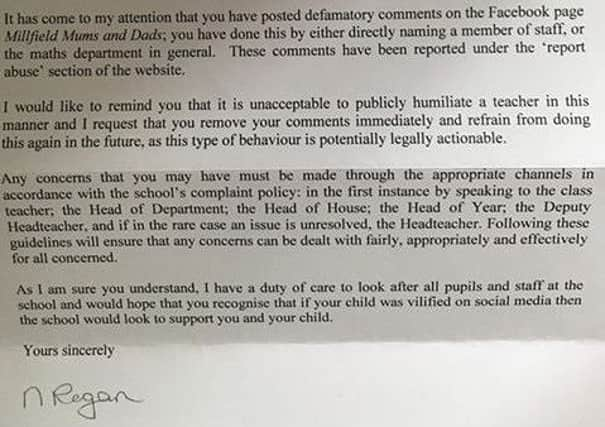Fylde coast headteacher threatens parents with possible legal action after reading comments made about teachers on Facebook


Nicola Regan, who heads up Millfield Science and Performing Arts College, in Belvedere Road, Thornton, said she sent 17 letters out after reading remarks “made about individual staff” in the ‘Millfield Mums and Dads group’, which has more than 500 members and has since changed its name.
But two mums who said they got letters on Saturday morning denied defamation, which is the written form of libel.
Advertisement
Hide AdAdvertisement
Hide AdSharleen Bridgewood, 34, of Broadwater Avenue in Fleetwood, said she got a letter after commenting on a now-deleted post asking “If anyone has concerns about two specific teachers”. She said hers was one of around 50 to 60 comments that were submitted.


She said she was “angry” at getting the letter, and added: “They should be concentrating on matters in school.
“What’s being put on there would be said face-to-face in the playground.”
And Katie Powell, 39, of Chequers Way in Thornton, was asked to “remove your comments immediately and refrain from doing this again in the future, as this type of behaviour is potentially legally actionable”, after she said she wrote one comment about a teacher, though she said: “I just put the facts down.”
Advertisement
Hide AdAdvertisement
Hide AdMiss Powell said Millfield is a “fantastic school”, but said: “I think a better worded letter would have been better than the one we have got.”
In her letter, dated last Tuesday, Mrs Regan said it was “unacceptable to publicly humiliate a teacher in this manner and I request that you remove your comments immediately and refrain from doing this again in the future, as this type of behaviour is potentially legally actionable.”
Mrs Regan, left, said she felt “morally obliged to communicate” after “comments were made about individual staff on a social media forum”. She said they were flagged up by other parents, and added: “A very small minority of parents received my letter, which was written following advice from the school’s solicitor.
“My letter clearly states that I have a duty of care to protect and support everyone at Millfield, and if a parent has a concern or complaint then there are proper channels to follow.
Advertisement
Hide AdAdvertisement
Hide Ad“As an organisation, we recognise there are always areas we can improve in our work, and the team works hard to do so.
“Millfield is a fantastic school to learn in, and to work in, and our culture of a ‘Team Millfield’ is at the heart of everything we all do: staff, parents, governors and pupils work together so the children who come here can be the very best they can be.
“That is just one reason why we are always over-subscribed and have such a great reputation in the community.”
While rare, schools have been known to threaten legal action because of social media remarks in recent years.
Advertisement
Hide AdAdvertisement
Hide AdIn 2017, a Kent school reportedly threatened to sue parents after they used Facebook to accuse teachers of failing to stop bullying.
And last year, a primary school headteacher in Staffordshire reportedly accused a parent of defamation after she shared a photo of an error-strewn crossword that had been issued for homework.
A statement is defamatory if it tends to expose a person to hatred, ridicule or contempt, cause them to be shunned or avoided, lower them in the estimation of right-thinking members of society generally, or disparage them in their business, trade, office, or profession. Cases are civil and not criminal.
Defences against defamation include the truth, and honest opinion, which must be based on provably true facts.